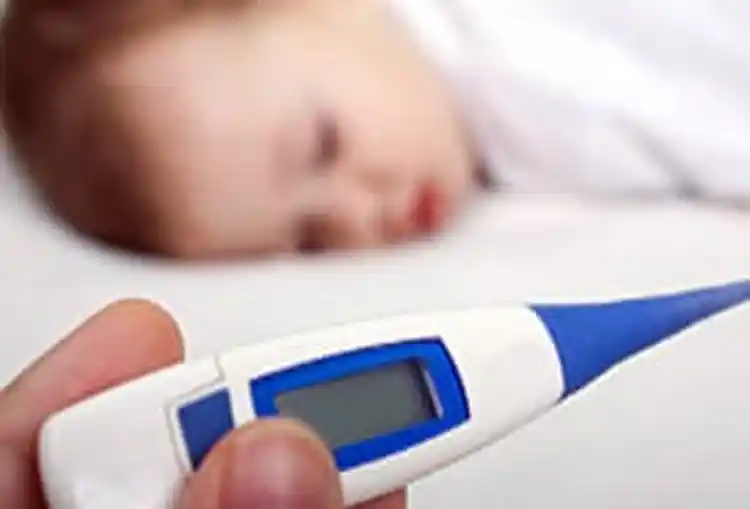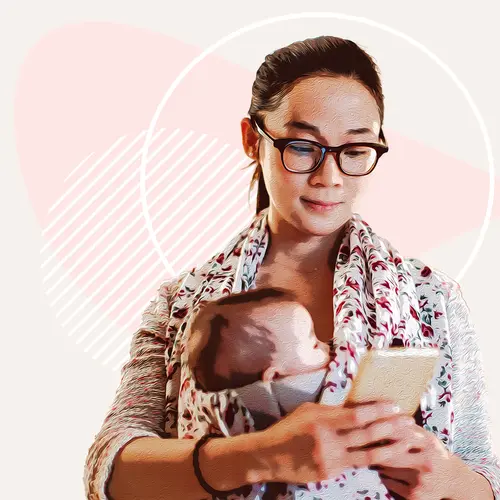What is Considered a Fever in Babies?

Hide Video Transcript
Video Transcript
Joy Brown
One of the scariest times in my life was right after my child was born. New moms have a lot of anxiety and I have a question from a concerned new mom who asks, "What is considered a fever in babies and when should parents be concerned?" Dr. Bhargava
Sure. Well a fever is considered 100.4 rectally. In babies it's really important to take the temperature rectally because that is the most accurate way of doing it. When kids become older then you can do it orally but certainly you don't wanna be putting a thermometer into a baby's mouth. Dr. Bhargava
Really, when you should be concerned depends on the age of the child. Generally less than six months of age we get a little bit --we take that fever a little more seriously than over six months of the age, and there's a number of reasons that is. Dr. Bhargava
One of the reasons is the immune system is not quite as developed as it is in older children. Also even though the child has had vaccines and of course it's really important for all children to have their vaccines, the vaccines take a little while to actually take to the system so that child is not as well protected as an older child might be. Dr. Bhargava
The most important thing about a fever in a baby or an older child, no matter what the age of a child is how the child looks as well. So if you have an older child that's four years old and has a 100.5 fever but they're lying there looking lethargic not active, you know looking sick to you, and as a mother you have a gut instinct, follow that instinct. If your child looks sick to you, you need to have that child seen it doesn't matter the age of the child or the temperature. Joy Brown
So in an infant lethargy can be a pretty serious signal? Dr. Bhargava
Absolutely! Joy Brown
To What? Dr. Bhargava
To sickness of some sort. So, in an infant, a young infant if you're talking to new mother the fever, the infant may not need to have a fever to actually be sick as well. So as I said before the way the infant looks is really important: whether they're eating, whether they're peeing and pooping, whether they have any energy or are interacting with you is a really important sign. Joy Brown
You mentioned vaccines and the fact that their immune system hasn't quite had time yet to get going in a new born to six months to a year. When are the first vaccines administered? Dr. Bhargava
It depends. The vaccines that actually prevent against most of the infantile infections are first administered at two months. There is a Hepatitis B vaccine that is administered in the hospital or at 1 month of age. Dr. Bhargava
But that's really not one that protects you against most of the infant illnesses. So, you have the one at two months, four months, six months and those are all booster shots to actually get to close to 100% immunity. Joy Brown
It's been a while since mine had those vaccines, so I couldn't quite remember. But the fever isn't always indicative of the of— Dr. Bhargava
Especially under one month of age, if the child doesn't look well that is not a good sign and you should always trust your gut about how your child looks, because you really do know your child best. Joy Brown
Good advice. I remember that feeling, that new mom feeling, but when is it okay to use over-the-counter fever medicines in an infant or is it? Dr. Bhargava
An over-the-counter product is okay to use probably about two to three months of age and specifically acetaminophen. Ibuprofen, we usually don't like to use until six months of age. Joy Brown
What's the difference? Dr. Bhargava
Well, great question. It's actually a different drug and it has different ways of lowering the temperature in the body. With ibuprofen, there seems to be a little bit of gastritis sometimes related to it and with little infant's stomach being so delicate, it's not something we really want them to be exposed to earlier than that. Joy Brown
I know none of us want to upset those stomachs when they are infants I know. 
